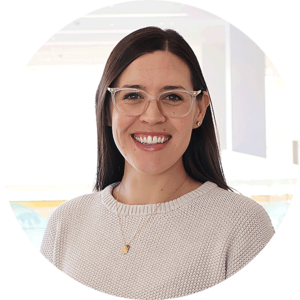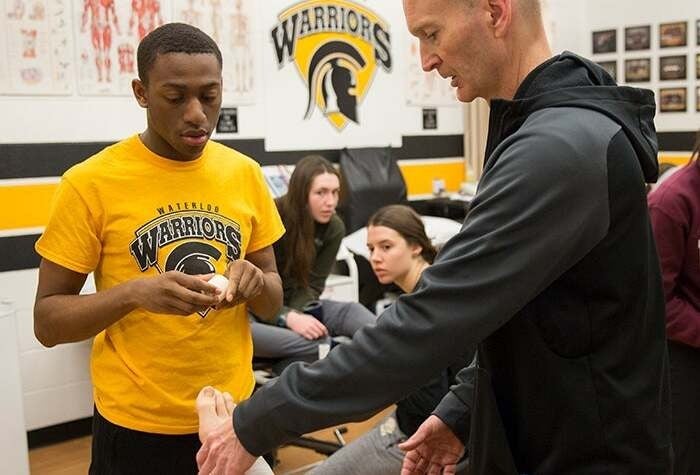Kinesiology degree

Become a leader in human movement science
If you want a program where you’ll explore the human body inside and out, you’ve found your fit.
Kinesiology at Waterloo was the first of its kind in the world. You’ll learn from world-class professors experts who are changing lives by creating solutions to big health challenges. You’ll combine biomechanics, anatomy, physiology, social sciences, nutrition, and neuroscience to gain the most comprehensive understanding of human movement.
Dive into over 20 immersive, interactive lab experiences — from sport injury management and exercise physiology to motor control, biomechanics, and first-year anatomy in the human cadaver lab — where you’ll turn textbook knowledge into real-world, practical skills.
Kinesiology is your gateway to a rewarding career in health care and the perfect launchpad for professional school (think medicine, physiotherapy, chiropractic, and more). With plenty of hands-on experience built into the program, co-op is an added bonus, integrating 20 months of paid experience into your degree.
Whether you eventually work with Olympic hopefuls or someone striving to overcome a cancer diagnosis, Kin is your in.
What courses will you take in Kinesiology?
First-year courses
You'll take a mix of courses from the Faculty of Health and the Faculty of Science to give you the foundations in the sciences for your upper-year classes.
After first year
About half of the classes you'll take will be Kinesiology courses, with topics ranging from environmental physiology to trauma biomechanics to exercise psychology. With your remaining classes, you can choose electives from many of the 100 subject areas at Waterloo to explore areas of interest, take pre-requisite courses, or pursue a minor.
View all the courses required for your degree.
Featured courses
Read student-written articles about opportunities available to you as a Kinesiology student.
Customize your degree in Kinesiology
At the end of first year, you have the option to add an area of focus within Kinesiology, such as
- Ergonomics and Injury Prevention
- Human Nutrition
- Medical Physiology (a great choice if you’re thinking of medical school)
- Neuroscience
- Rehabilitation Sciences (a great choice for physiotherapy, chiropractic, or other rehabilitation professional programs)
You can also include one of the minors available to all Waterloo students. Popular choices include Psychology, Human Resources Management, French, and Management Studies.
Tips from a student
Kinesiology student Alysa explains how you can personalize your program as you go.
Faculty:
Faculty of Health
Degree:
Bachelor of Science in Kinesiology
Available as a co-op program?
Yes
Available as a regular program?
Yes
Available as a minor?
No
Get hands-on experience in class. You'll have 20 required and optional lab experiences to choose from. Gain the practical skills to understand movement problems that occur in sports, industry, rehabilitation, and fitness.
Study anatomy in depth. Waterloo is one of Canada’s first non-medical schools to house a School of Anatomy, giving you the chance to study anatomy on real human cadavers right in your first year.
Co-op = relevant paid work experience
In the world's leading co-op program, you'll explore potential careers, learn to interview for jobs, graduate with up to two years of valuable experience — and make money!
Sample co-op job titles
- Student ergonomist
- Physiotherapy assistant
- Health and safety program coordinator
- Clinical research assistant
- Chiropractic assistant
- Outdoor education student
Co-op work-study sequence
Starting in second year, you'll normally alternate between school and work every four months, integrating your classroom learning with real-world experience. You can return to the same employer for a couple of work terms to gain greater knowledge and responsibility or work for different employers to get a broad range of experience.
| Year | September to December (Fall) | January to April (Winter) | May to August (Spring) |
|---|---|---|---|
| First | Study | Study | Off |
| Second | Study | Study | Co-op |
| Third | Co-op | Study | Co-op |
| Fourth | Study | Co-op | Co-op |
| Fifth | Study | Study | - |
Your first term will be after your second year (May to August 2028).
What can you do with a degree in kinesiology?
Graduates often pursue careers where they can help people. Common areas include physiotherapy, chiropractic, ergonomics, health and safety, exercise management, and nutrition, often in clinical settings such as hospitals or health centres.
Sample careers
- Orthopaedic Surgeon – MSK Centre
- Ergonomist – General Motors of Canada
- Physiotherapist – McMaster University, Health Services
- Occupational Therapist – 1 to 1 Rehab
- Pedorthic Technician – Bioped Footcare Centres
- Respiratory Therapist – Alberta Health Services
- Chiropractor – Evolve Massage Wellness
Learn about the future of careers in health and helping professions.
Read profiles and view videos about the path Kinesiology graduates took to pursue their career.
Further education
While the full range of further education depends on your personal interests and goals, graduates often choose professional and graduate programs in medicine, physiotherapy, occupational therapy, chiropractic, biomechanics, anatomy, and neuroscience.
Considering med school? Learn how you can get into medical school.
Common questions about the program
What’s the difference between Kinesiology and similar programs at other universities?
Waterloo’s Kinesiology program is a Bachelor of Science (BSc), which means that you’ll study the science behind how the human body works. As a Kinesiology student, you’ll apply your classroom learning in our many state-of-the-art labs and have over 70 Kinesiology courses and labs to choose from, ranging from anatomy to sport injury to neuroscience.
In addition to labs, you can pursue additional experiential learning opportunities like co-op and our EDGE certificate program, giving you a distinct advantage as you start your career or pursue further education.
Does this program meet the prerequisites for medical school and the Medical College Admission Test (MCAT)?
Waterloo Kinesiology is a popular option if you plan to pursue medicine. If you’re interested in a future clinical health profession, you should consult the requirements of the schools you want to attend. Between your required and elective courses, you’ll be able to meet the requirements for most medical schools in Canada and around the world. View tips on how to get into medical school.
How does Kinesiology compare to Health Sciences programs?
Waterloo’s Kinesiology program is a Bachelor of Science degree focused on understanding how the human body functions. In this program, you’ll focus on anatomy, biomechanics, physiology, nutrition, neuroscience, and social science. Health Sciences programs may have some similar foundational science courses but tend to focus more on population health and disease prevention rather than how the body functions.
If I do the Human Nutrition minor, can I become a dietitian?
The Human Nutrition minor is excellent preparation if you want advanced knowledge in cellular metabolism and physiological responses to nutrients, the impact of diet on chronic disease risk, and examinations of food choices in populations. However, this minor is not a direct pathway to becoming a Registered Dietitian in Canada.
Do I need to be physically active to be in this program?
Absolutely not. Waterloo’s Kinesiology program is a science-based program, so you only need to be academically strong to succeed. You’ll participate in labs where fitness assessments may be performed as part of some assessments, but students with diverse ranges of physical activity are able to participate.
What is the difference between life sciences and kinesiology?
In general, a health sciences degree program, such as a bachelor's degree in kinesiology, focuses on human health whereas a life sciences degree focuses on all living things. Learn more about our Health Sciences and Life Sciences programs.
How long does it take to complete this program?
It takes four years to complete this program as a full-time student through the regular system of study in which you’ll take courses between September and April each year and have your summers off.
You can also choose the co-op system of study where you’ll alternate between full-time studies and full-time jobs relating to your program. A co-op program takes five years to complete — and you’ll graduate with nearly two years of paid work experience.
Is this program available online?
No. While you may be able to take some courses online, most courses required for the Kinesiology degree are available through in-person classes only.
Admission requirements
Ontario students: six Grade 12 U and/or M courses including
- Any 4U English (minimum final grade of 70%)
- Advanced Functions or Calculus and Vectors (minimum final grade of 70%)
- Any two of Biology, Chemistry, and Physics (minimum final grade of 70%)
Admission averages
Not studying in Ontario? Search our admission requirements.
How to apply
Apply directly to this program on your application.
Related programs
Get information about programs, applying, and more!
Subscribe to our monthly newsletter
Get valuable updates and tips sent straight to your inbox!

Connect with us
Questions about courses, programs, requirements, or careers?
Please contact Clare Stevens, our Faculty of Health recruitment co-ordinator who can answer any questions you have.
From the Missing Manual
Check out our Missing Manual website for tips and advice from Waterloo students and staff.

Paving the road to medical school with hands-on learning
Kelsey knew the health care field would be a perfect fit for her. With its broad scope and active approach to health and wellness, Waterloo's Kinesiology program checked all the boxes.

5 ways to get real-world experience before graduating from Kinesiology
Whether you’re in co-op or the regular stream, there are so many ways for Kinesiology students to put what they learn to work and prepare for life after graduation.

Hands on: sports therapy with the Warriors
While fundamental sciences are definitely part of Kinesiology theory, courses like KIN 140L — Sports Injury Management Lab — focus on the practical.